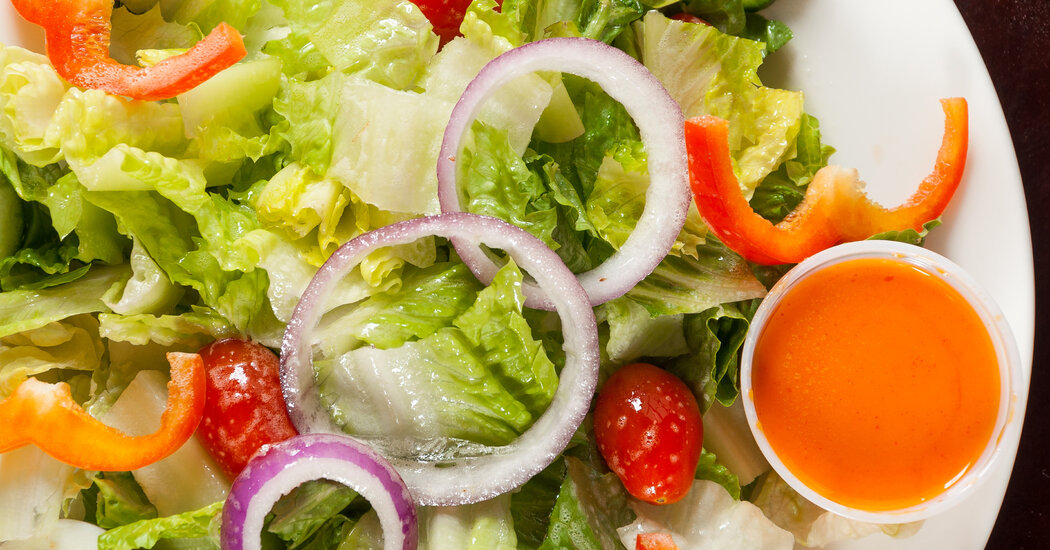Since 1950, the federal government has defined French dressing and its composition. An industry group said that the standards were outdated and should end.
French dressing, long a slacker in salad dishes and on supermarket shelves frequented by ranch-obsessed Americans, will no longer be regulated by the Food and Drug Administration, the agency said on Wednesday.
Since 1950, the federal government has defined French dressing by a rigid set of standards that it had said would protect consumers from “economic adulteration,” or food fraud, and reflect their expectations about food.
Distinguished by its reddish-orange color and sweet taste, French dressing had been required to contain at least 35 percent vegetable oil, in addition to an acid, such as vinegar or lemon or lime juice.
But an industry group contended that the regulations were, well, passé. The standards, it said, hampered the ability of food companies to tweak their recipes to meet changing tastes and dietary needs. The group wondered: Why should French dressing be bound by regulations when most other dressings are not?
The group, the Association for Dressings & Sauces, petitioned federal regulators in 1998 to lift the regulations, which the F.D.A. finally agreed to recommend in December 2020. In a final rule filed on Wednesday and published on Thursday in the Federal Register, the agency said it was moving forward with the change, which will take effect in 30 days.
“This rulemaking is part of our comprehensive effort to modernize food standards to reduce regulatory burden and remove barriers to innovation,” the F.D.A. said.
The Association for Dressings & Sauces did not immediately respond to a request for comment on Wednesday.
Ken Albala, a food historian and professor at the University of the Pacific in Stockton, Calif., said on Wednesday that French dressing had fallen out of favor, especially among those who prize delicate salad greens like mâche and fancier dressings.
It’s not even French, he said of the dressing, which evolved from a simple vinaigrette made of oil and vinegar to a sweet concoction.
“I can picture the people at Kraft sitting down at a board meeting and the chief marketing guy saying, ‘Do you know the sales of French dressing have dropped off by x and y?’ ” Professor Albala said. “I tried really to remember the last time I had French dressing. There’s obviously nothing French about it.”
Professor Albala said that the change could allow food companies to revamp their recipes for French dressing as a way to try to boost sales.
Daniel Hare, a spokesman for Conagra Brands, a member of the industry group and the parent company of Wish-Bone, a salad dressing staple of many American tables, said Wednesday, “We are aware of the rule change and will continue to monitor for any new developments.”
The Kraft Heinz Co., which was not listed as a member of the Association for Dressings & Sauces, did not immediately respond to a message seeking comment.
On the Wish-Bone website, only 29 percent of reviewers recommended the brand’s creamy French dressing, which received 2.1 stars out of 5. Many of the negative reviews clamored for the company to bring back its deluxe French dressing.
One reviewer, Dennis from Las Vegas, wrote that the creamy French dressing tasted “like mayo’s reject cousin.”
“Give the people what they want,’’ he wrote. “This stuff is always sitting on the shelves fully stocked at all grocery stores.”
In a 2017 survey conducted by the Association for Dressings & Sauces, French dressing barely appeared on a list of favorite dressings. Ranch was the champ, with 40 percent of Americans embracing it as their go-to salad dressing.
“Ranch, I’m told, is actually considered a beverage in the Midwest,” Professor Albala said in jest.
Ranch’s nearest competitor, Italian, came in at 10 percent.
Over the decades, the F.D.A. said, the rules for French dressing had been amended to allow food companies to use safe and suitable additives to give the dressing its distinctive color, which originally came from tomatoes or tomato-derived ingredients.
The regulations have not stopped food companies from selling low-fat formulations of the dressing that contained less oil than had been required, according to the F.D.A., which re-evaluated its oversight of the dressing as part of its Nutrition Innovation Strategy.
“We conclude that a standard of identity for French dressing no longer promotes honesty and fair dealing in the interest of consumers,” the agency said.
In response to the F.D.A.’s announcement of the change on Twitter, some people mocked the agency on Wednesday and said that it should concentrate more on its regulatory role in the coronavirus pandemic. The agency said in the newly published rule that it had received at least one comment as part of its review that questioned its priorities.
The F.D.A. responded that the action meshed with a 2011 executive order that requires federal agencies to re-evaluate existing regulations to identify those “that might be outmoded, ineffective, insufficient, or excessively burdensome, and to modify, streamline, expand, or repeal them.”
Professor Albala said that the F.D.A.’s role had changed since after World War II, when Americans didn’t quite know what to make of TV dinners, dehydrated foods and Saran Wrap.
“They were there right as the food industry was going gangbusters to make sure that customers were getting what they thought they were getting,” he said. “They’re facilitating business now.”


























